Finding the best EHR for psychologists can feel like a daunting task, but the right software will streamline your work and protect sensitive patient information.
As a psychologist, your work is centered on understanding people, not chasing paperwork. Yet, documentation, insurance billing, scheduling, and compliance often consume hours you’d rather spend with clients. That’s where the right EHR system for psychologists can transform your practice.
In this guide, we’ll cover everything you need to know about EHR systems for psychologists, how they differ from EMRs, their core benefits, and the top EHR systems for 2025.
What is an EHR, and Why Do Psychologists Need Them?
For psychologists, an Electronic Health Record (EHR) isn’t just digital paperwork, it’s the backbone of modern practice management.
Unlike general medical systems, behavioral health EHRs are tailored for therapy.
They go beyond storing files by helping you capture session notes, build treatment plans, communicate with clients, and manage billing, all in one secure platform.
This matters because psychologists often face a triple burden: heavy documentation, complicated insurance claims, and strict HIPAA compliance. A specialized EHR helps lift that load by:
- Offering therapy-specific templates for progress notes and treatment plans
- Speeding up insurance claims with fewer denials
- Supporting integrated telehealth for remote or hybrid sessions
- Creating audit trails and compliance-ready reports
- Protecting sensitive patient data with HIPAA-grade security
Without an EHR, many mental health professionals end up juggling spreadsheets, paper files, and disjointed apps, a recipe for inefficiency and burnout.
But, EHR vs. EMR: What’s the Difference?
Before choosing the right EHR, it’s important to know how it differs from an EMR.
- EMR (Electronic Medical Record): A digital version of a paper chart within a single practice. It tracks diagnoses, patient records, and treatments but usually stays siloed.
- EHR (Electronic Health Record): A broader practice management software that goes beyond notes. It includes billing, scheduling, integrated telehealth sessions, outcome tracking, and client portals, designed for information-sharing across providers, insurers, or even group practices.
Think of EMR as a digital filing cabinet. EHR is a therapy EHR built for full practice management and patient engagement.
Benefits of EHRs for Psychologists
The right EHR provider can transform your therapy practice by reducing your administrative workload and improving client care.
Here’s what behavioral health professionals gain when adopting a specialized EHR:
- Time savings: Automate notes, claims, and scheduling tasks (average saves practitioners hours each week)
- Improved accuracy: Structured templates and custom forms reduce data entry errors
- Faster payments: Insurance integrations speed up reimbursements and improve cash flow
- Compliance confidence: HIPAA compliance ensures sensitive data and patient records are protected
- Better client experience: Patient portals, video conferencing, and appointment reminders improve accessibility
- Practice scalability: EHRs support growing practices, scaling from solo practitioners to larger practices
Ultimately, a therapy EHR isn’t just software; it’s a way to free yourself from admin overload and focus on better patient care.
Top 8 EHR Platforms for Psychologists (2025)
Here’s a breakdown of the best EHR systems designed specifically for mental health care and therapy practices.
1. SimplePractice- Best for intuitive solo practice management
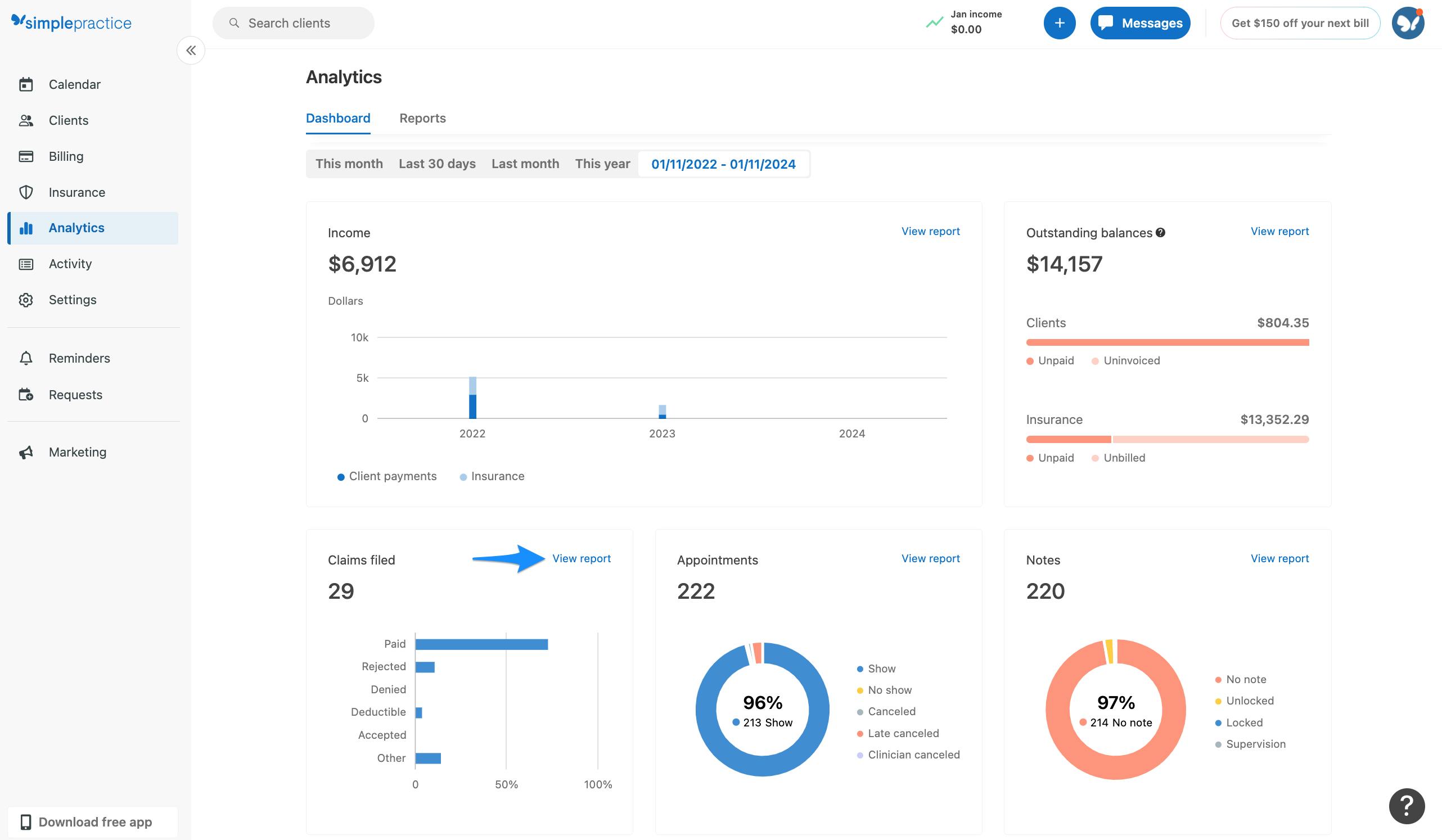
SimplePractice is known for its polished client portal and seamless telehealth experience, making it a favourite for psychologists who want everything, intake, scheduling, billing, and video sessions, all in one place.
Key Features:
- Combines intake, scheduling, billing, and telehealth in one system
- Integrated claims support with fewer denials
- Automated reminders + Google Calendar sync for smooth scheduling
- Easy-to-use interface that new users pick up quickly
Pricing: It starts at $49/month for Starter, $79/month for Essential, and $99/month for Plus plan, with a 30-day free trial and the option to cancel anytime.
Best for: Solo practitioners and small practices wanting an intuitive interface with integrated telehealth.
2. Valant
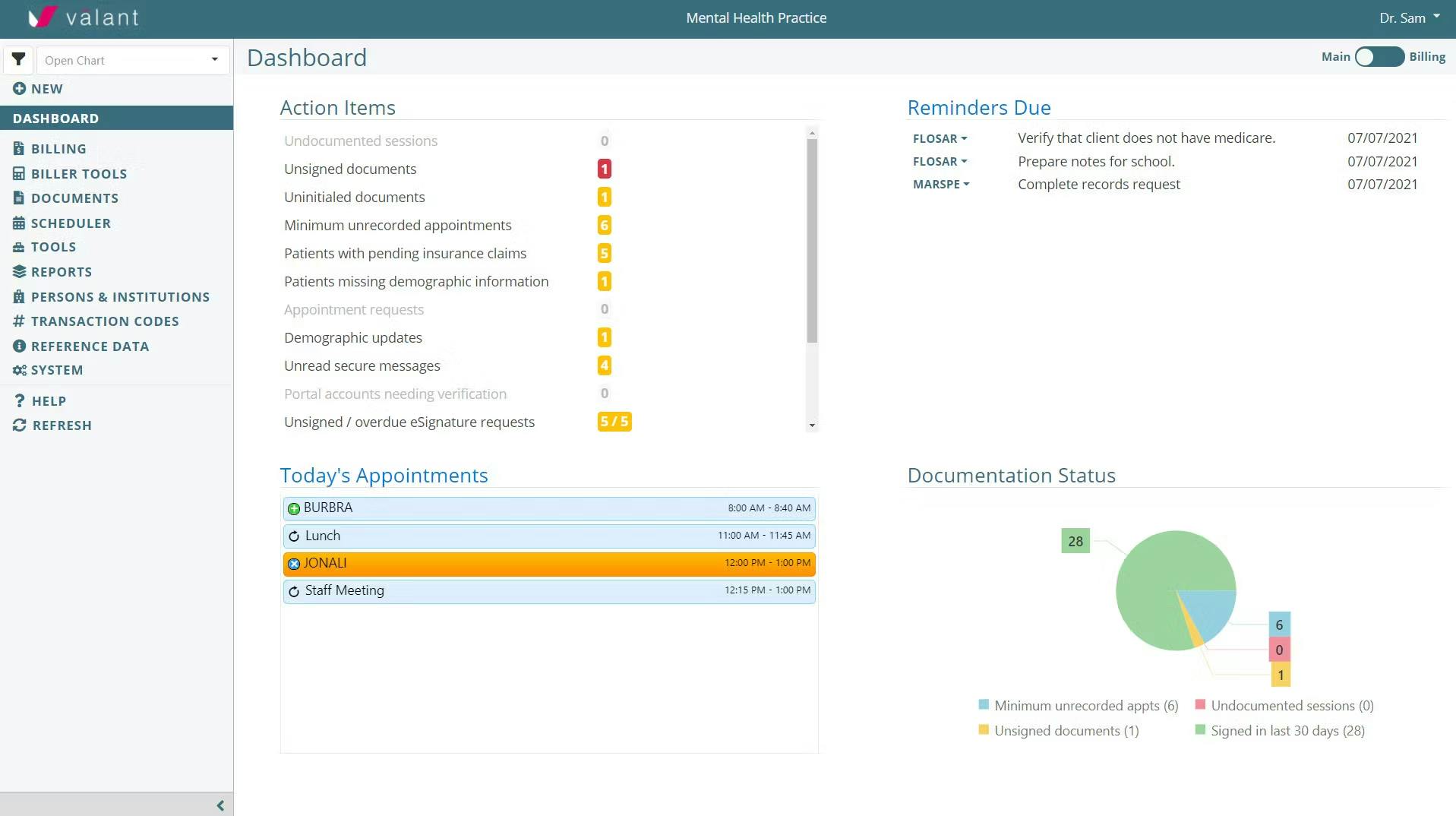
Valant stands out with its advanced revenue cycle management and outcome-tracking dashboards, helping larger practices optimize both clinical outcomes and financial performance.
Key Features:
- Revenue cycle management with advanced claims automation
- Analytics dashboards tracking both finances and outcomes
- Role-based permissions for multi-clinician practices
- Patient engagement tools built into the portal
Pricing: Custom pricing (higher-end).
Best for: Larger practices and group practices that need robust analytics + billing support.
3. TherapyNotes
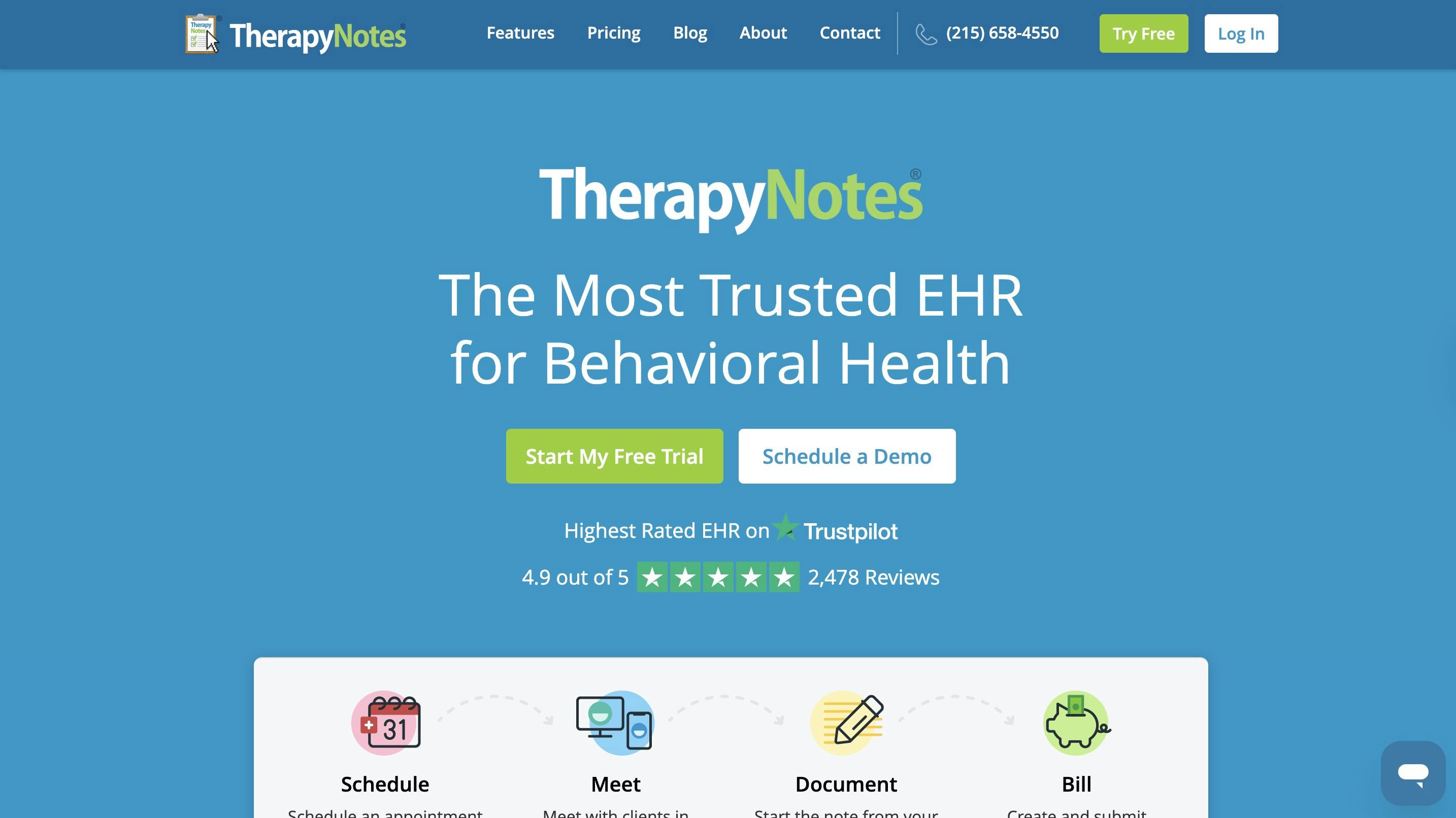
TherapyNotes is trusted for its audit-ready documentation templates and strong insurance integrations, built to keep psychologists compliant without adding stress.
Key Features:
- Built-in SOAP, DAP, and treatment plan templates
- ERA/EDI insurance processing with live claim tracking
- Patient portal for scheduling and payments
- HIPAA compliance + top-rated customer support
Pricing: Starts at $59/month for solo practitioners, $69/month for the first clinician in group or enterprise plans (+$40/month per additional clinician).
Best for: Private practice therapists and clinics needing structured documentation and billing.
4. TheraNest
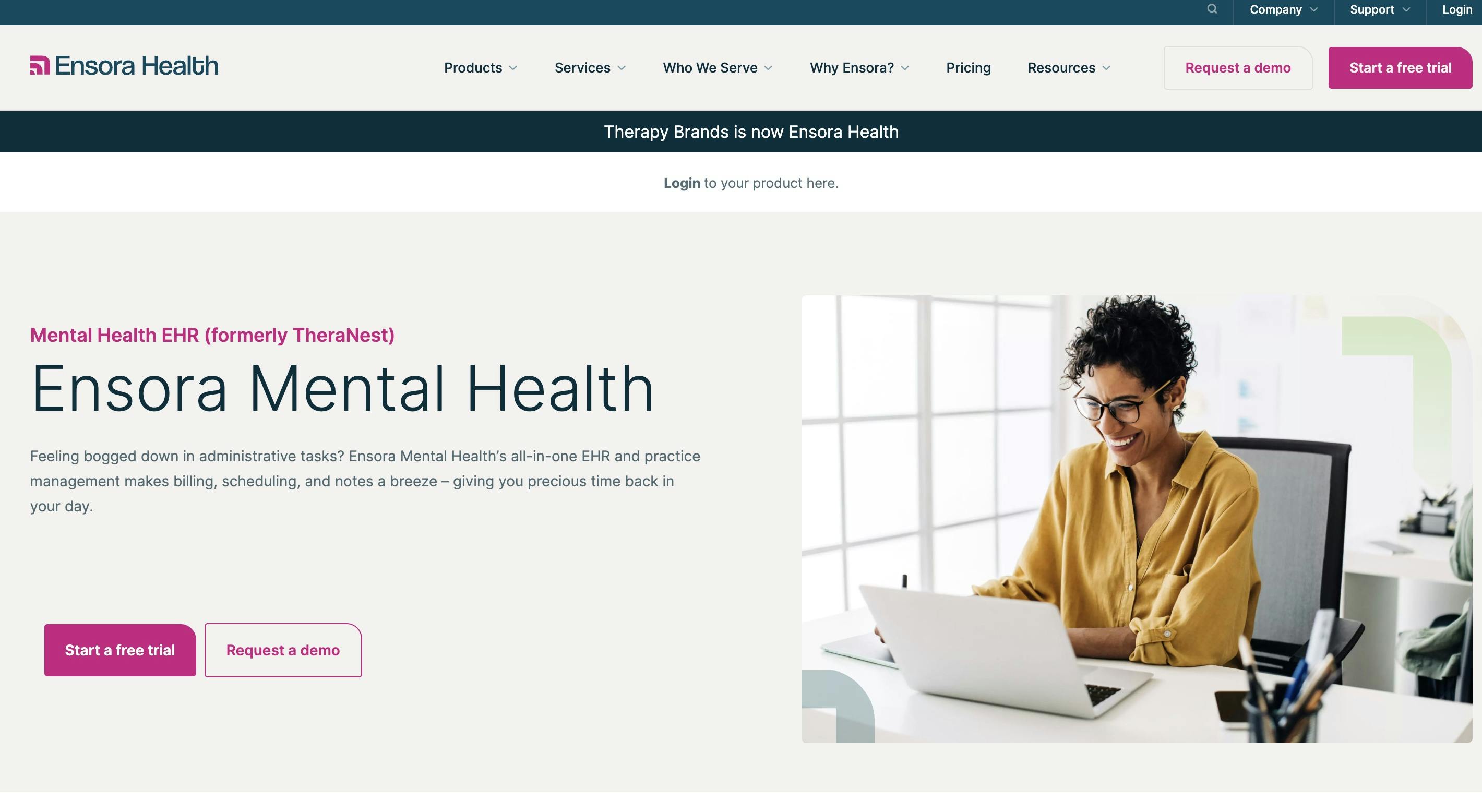
TheraNest balances affordability with scalability, offering group scheduling and batch claim filing- two features rarely found at its price point.
Key Features:
- Offers SOAP, BIRP, and customizable note templates
- Built-in telehealth (no third-party apps needed)
- Batch insurance claim filing for efficiency
- Group scheduling for couples/family sessions
Pricing: Starts at $27/month (Essentials), $54/month (Advanced), and $82/month (Premier)- billed annually with one month free.
Best for: Small practices and mid-sized group practices, balancing cost and features.
5. Therapy Appointment
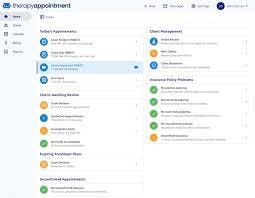
TherapyAppointment is one of the few platforms with pricing tied to session volume, making it ideal for psychologists who want affordability while their caseload grows.
Key Features:
- Pricing based on session volume - perfect for scaling up
- Customizable notes made for psychologists
- Built-in card processing for payments
- HIPAA-ready telehealth tools
Pricing: Starts at $10/month (up to 10 sessions), $39/month (11–39 sessions), and $59/month (40+ sessions), after the first 30 days free for solo practice.
Best for: Budget-conscious solo practitioners needing affordable EHR software.
6. ICANotes
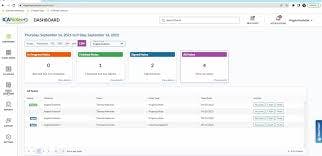
ICANotes shines with its DSM-5/ICD-10 integrated templates and mental status exam builder, perfect for psychologists handling complex or multidisciplinary cases.
Key Features:
- DSM-5 + ICD-10 integrated templates
- E-prescribing and med management
- Mental status exam builder
- Automatic audit trail for compliance
Pricing: For full time clinicians, price starts at $55/month (Notes Only), $75/month (Non-Prescribing), and $213/month (Prescribing).
Best for: Psychologists who need highly structured, medical-grade documentation.
7. Lightning Step
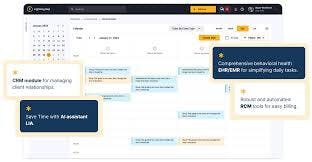
Lightning Step is built for specialty care, offering custom workflows for addiction and dual-diagnosis programs alongside its all-in-one CRM + EHR + billing system.
Key Features:
- Combines CRM, EHR, and billing in one platform
- Custom workflows for addiction + dual-diagnosis treatment
- Outcome tracking dashboards for clinical progress
- Full revenue cycle management support
Pricing: Custom pricing.
Best for: Clinics in behavioral health or dual-diagnosis needing multiple platforms in one.
8. Sessions Health
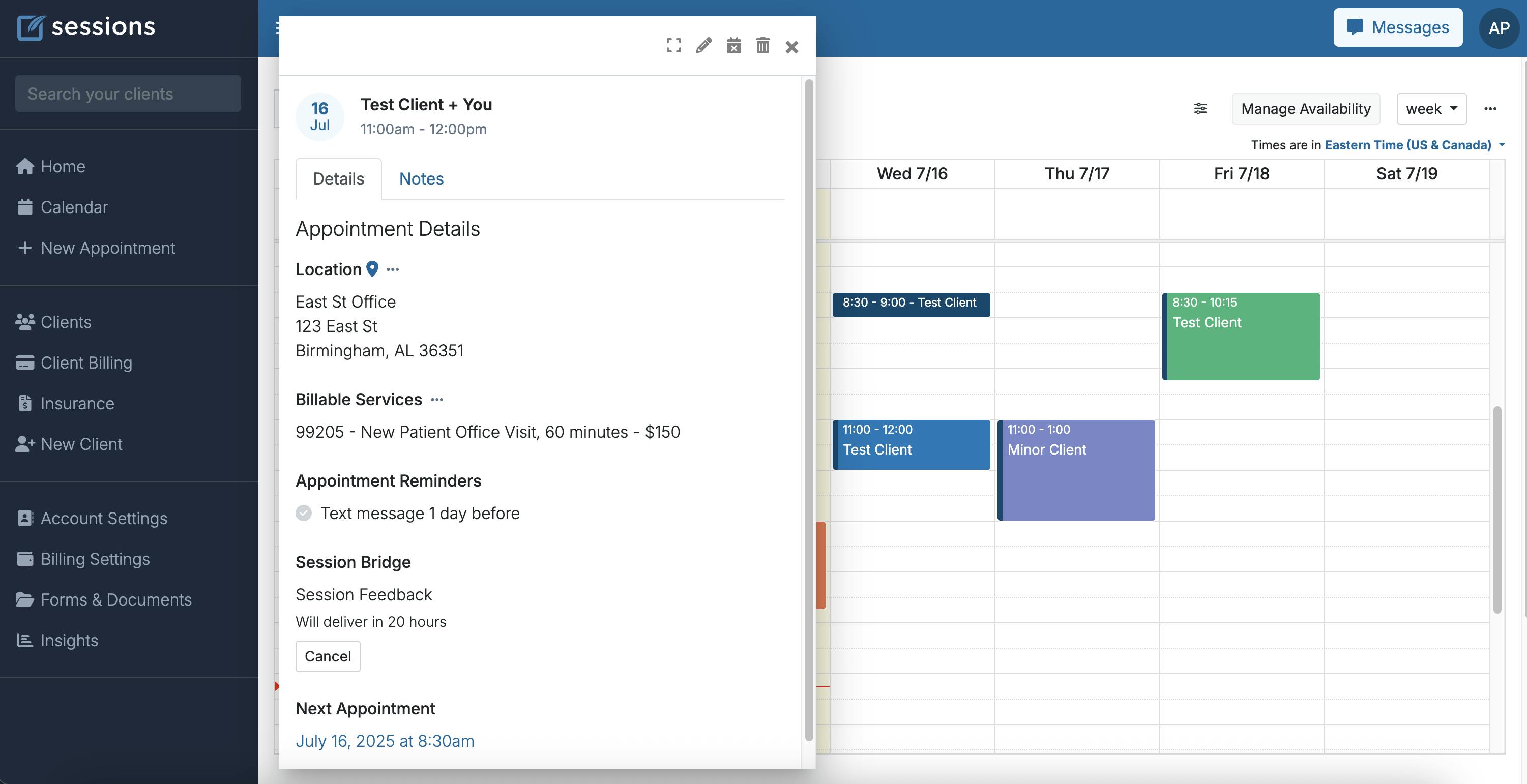
Sessions Health combines a clean, modern interface with a rare free plan, making it one of the most accessible EHR options for solo and small practices.
Key Features:
- Free starter plan makes it accessible
- Clean UI, minimal learning curve
- Flexible therapy note templates
- Telehealth, reminders, billing, and messaging included
Pricing: Free plan available for up to 3 clients; Professional plan $39/month (unlimited clients), with $29/month per additional practitioner and a 30-day free trial.
Best for: Small practices and private practices seeking affordable, modern therapy EHR software.
Quick Comparison Table
Here’s a quick comparison of the top EHRs for psychologists so you can see at a glance which platform fits your workflow best:
Tool | Starting Price | Best For | Standout Feature |
|---|---|---|---|
SimplePractice | Starter $49/mo, Essential $79/mo, Plus $99/mo | Solo practitioners & small practices | All-in-one scheduling, billing, telehealth |
Valant | Custom pricing | Large practices & enterprises | Advanced analytics + revenue cycle management |
TherapyNotes | $59/mo solo; $69/mo first clinician (+$40/additional) | Private practice therapists & clinics | Built-in SOAP/DAP templates + compliance support |
TheraNest | $27/mo Essentials; $54/mo Advanced; $82/mo Premier (annual) | Small to mid-sized practices | Affordable group scheduling + batch claims filing |
TherapyAppointment | $10/mo (10 sessions), $39/mo (11–39), $59/mo (40+) | Budget-conscious solo practitioners | Session-based pricing + HIPAA-ready telehealth |
ICANotes | $55/mo (Notes Only), $75/mo (Non-Prescribing), $213/mo (Prescribing) | Clinicians needing detailed documentation | DSM-5/ICD-10 integrated structured templates |
Lightning Step | Custom pricing | Behavioral health & dual-diagnosis clinics | CRM + EHR + billing in one platform |
Sessions Health | Free plan (up to 3 clients); Pro $39/mo; +$29/additional | Small & private practices | Modern, clean UI + free starter plan |
Comparison Overview
Here’s a snapshot of the top EHR systems for psychologists in 2025 , so you can match the right tool to your practice style:
- SimplePractice → Best for intuitive, all-in-one solo practice management
- Valant → Best for enterprise-level analytics and billing
- TherapyNotes → Best for compliance-focused workflows with structured templates
- TheraNest → Best for affordable mid-sized practice management
- TherapyAppointment → Best for budget-conscious solo practitioners
- ICANotes → Best for medical-grade documentation and structured templates
- Lightning Step → Best for addiction treatment and dual-diagnosis clinics
- Sessions Health → Best for small practices seeking affordability + modern design
Each EHR here shines in a different dimension - from budget-friendly entry points to enterprise-ready management. The right choice depends on your practice size, documentation preferences, and compliance requirements.
How to Choose the Right EHR for Your Practice
Switching to an EHR is a big investment, in both time and cost. The right choice depends on your practice size, budget, specialty needs, and long-term goals. Use these guiding factors and questions:
- Practice size: Solo practitioners may prefer SimplePractice or TherapyAppointment, while group practices or clinics may need Valant, ICANotes, or Lightning Step.
- Budget flexibility: Are you optimizing for affordability (Sessions Health, TheraNest), or do you need enterprise features ($200+/month per clinician)?
- Average monthly note volume: Does unlimited pricing make more sense, or will per-note/session billing save money?
- Documentation style: Do you want AI-powered note drafting, or are structured templates (SOAP, DAP, BIRP, EMDR) enough?
- Telehealth integration: How important is native, HIPAA-compliant video to your practice model?
- Specialty needs: Dual-diagnosis, addiction, or multidisciplinary clinics may need tailored workflows (Lightning Step).
- Learning curve: Some platforms are plug-and-play; others require training and onboarding support.
- Integrations: Does the EHR sync smoothly with your calendar, billing software, or existing telehealth platform?
- Scalability: Are you planning to grow in the next 12–18 months? Choose a system with multi-clinician support and reporting.
Pro tip: Trial at least 2–3 platforms with real sessions before locking in. That way, you’ll see how well each handles your documentation style, billing workflows, and therapy modalities.
Frequently Asked Questions (Psychologists & EHRs)
Q1. Why do psychologists need a specialized EHR instead of a general medical system?
A. Because behavioral health has unique documentation needs - progress notes, treatment plans, therapy-specific templates, and client engagement tools that general systems rarely support.
Q2. Which EHR is best for solo practitioners?
A. SimplePractice, Sessions Health, or TherapyAppointment - they’re affordable, easy to set up, and include telehealth.
Q3. Which EHRs are best for group practices or clinics?
A. Valant, ICANotes, and Lightning Step -they offer team permissions, analytics, and enterprise-level billing.
Q4. Are all these EHRs HIPAA compliant?
A. Yes, all the platforms listed here meet HIPAA standards, with encryption, audit logs, and secure data hosting.
Q5. Do these EHRs integrate with insurance billing?
A. Most do , TherapyNotes, Valant, and TheraNest are especially strong for claim automation and ERA/EDI support.
Q6. What if I want free or low-cost options?
A. Sessions Health offers a free plan for up to 3 clients, and TherapyAppointment scales pricing by session volume.
Q7. How do EHRs help reduce burnout?
A. They automate repetitive admin from appointment reminders to claim submissions giving psychologists more time with clients.
Q8. What’s the biggest mistake when choosing an EHR?
A. Picking based on price alone without considering workflows, compliance, and scalability.
Q9. Can EHRs support telehealth?
A. Yes, most major providers now include HIPAA-compliant video and integrated scheduling.
Q10. How do I know if an EHR will fit my therapy style?
A. Use the free trial period with real client sessions to test how well it supports your note-taking, templates, and billing needs.

